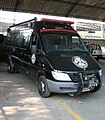Coordenadoria de Recursos Especiais
This article has multiple issues. Please help improve it or discuss these issues on the talk page. (Learn how and when to remove these template messages)
|
| Coordenadoria de Recursos Especiais | |
|---|---|
 | |
| Active | 1969–present |
| Country | |
| Type | Police tactical unit |
| Role | Counter-terrorism Hostage rescue Law enforcement Special operations |
| Garrison/HQ | Rio de Janeiro, Brazil |
| Nickname(s) | CORE |
| Colors | Black |
| Mascot(s) | M16 crossed and knife in the skull |
| Anniversaries | 4 July 1969 |
The Coordenadoria de Recursos Especiais (Portuguese for Coordination of Special Assets), best known by its acronym CORE, is the police tactical unit of the Civil Police of Rio de Janeiro State. It was formed on 4 July 1969 and is comparable to São Paulo's GOE.
Duties[edit]
- Operations against organized crime
- High-risk arrests
- High-risk VIP's escort
Services[edit]

Its structure is composed of the following operating units:
- Serviço de Operações e Táticas Especiais (SOTE) - Special Operations and Tactics Service
- Seção de Snipers; - Sniper Section
- Seção de Operações Táticas (SOT) - Tactical Operations Section
- Grupo de Operações Especiais (GOE) - Special Operations Group
- Seção de Operações Aéreas (SOA) - Air Operations Section
- Seção de Operações Marítimas e Ribeirinhas (SOMAR) - Maritime and Riverine Operations Section
- Seção de Gerenciamento de Crises (SGC) - Crisis Management Section
- Seção de Treinamento Especializado (STE) - Specialized Training Section
- Seção de Logística e Equipamentos (SLE) - Logistic and Equipment Section
- Serviço de Apoio Policial (SAP) - Police Support Service
- Serviço de Planejamento Operacional (SPO) - Operational Planning Service
- Serviço Aeropolicial (SAER) - Air Police Service
- Esquadrão Anti-bomba (EAB) - Bomb Squad
- Serviço de Suporte Operacional (SESOP) - Operational Support Service
Weapons[edit]
- Glock pistols
- Heckler & Koch MP5
- FN FAL[1]
- M16A2 Commando[1]
- Colt M4 MONOLITHIC CQB
- ArmaLite AR-10
- Armalite SuperSASS[2]
- Minimi MK2[1]
Armoured Vehicles[edit]

CORE has armoured vehicles, popularly known caveirões, used mainly in operations where conflict with drug traffickers is likely. The main purpose of these armoured vehicles is to protect trim elements and destroy barriers used by drug traffickers. Armoured vehicles are still essential in supporting the rescue of trapped police units and in removing the wounded from confrontations.
Bibliography[edit]
- MAULAZ, Paulo - Operações Especiais, Rio de Janeiro, PCERJ, 2006. (Port)
Gallery[edit]
See also[edit]
- Civil Police (Brazil)
- Civil Police of Rio de Janeiro State
- GOE (Brazil)
- GATE (Brazil)
- List of police tactical units
References[edit]
This article needs additional citations for verification. (March 2023) |
- ^ a b c "World Infantry Weapons: Brazil". 2016-06-02. Archived from the original on 2016-06-02. Retrieved 2022-10-08.
- ^ "Rio's Civil Police in Action and Pics -". The Firearm Blog. 2017-07-05. Retrieved 2023-02-25.
External links[edit]
- Civil Police of Rio de Janeiro State official website, in Portuguese
- CORE - Air operations
- November operations (in Portuguese)





